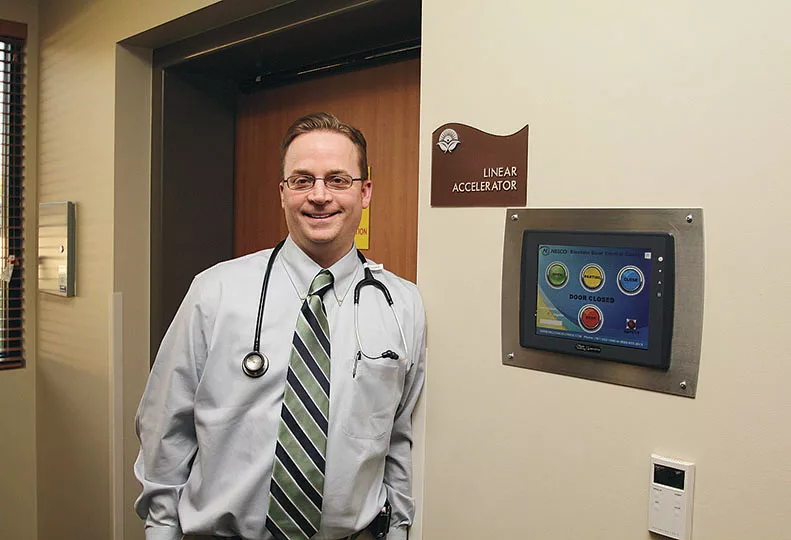
Home » Cancer Care Northwest gets tech boost
Cancer Care Northwest gets tech boost
Recently created alliance also helping new Valley clinic ramp up quickly

December 5, 2013
Cancer Care Northwest’s new Valley clinic is off to a running start, due largely to new technology on hand for radiation treatments that target cancer tumors more precisely with less exposure to healthy organs, says Dr. Christopher Lee, a radiology oncologist at the clinic.
The Spokane-based, physician-owned practice opened its 38,000-square-foot Valley clinic on Oct. 7 at 1204 N. Vercler, just east of Valley Hospital.
The clinic’s linear accelerator, equipped with new radiation-treatment technology named RapidArc, also is getting numerous referrals through a recently formed regional cancer alliance that includes Cancer Care Northwest, Spokane-based Providence Health Care, and Coeur d’Alene-based Kootenai Health, Lee says.
"RapidArc therapy is a physics and computer calculation-intensive therapy that is utilized to improve focusing of the radiation on the tumor and protect surrounding critical areas or organs," he says. "It has added software sophistication with submillimeter accuracy."
The technology is the latest advancement in a type of treatment called stereotactic body radiation therapy (SBRT), and Cancer Care Northwest is one of the first cancer treatment providers in the Spokane region to have it, he says.
SBRT is used to treat certain tumors almost anywhere on the body, Lee says.
Cancer Care Northwest also maintains a relationship with Gamma Knife of Spokane, which treats certain brain tumors with a different radiation-delivery technology.
The RapidArc technology delivers the radiation in a single continuous rotation with variable focus, dosage, and speed in treatments that last 10 to 20 minutes, compared with 40 to 90 minutes for conventional SBRT, Lee says.
Prior to the RapidArc advancement in SBRT, the gantry stopped in several positions to deliver radiation from different angles, resulting in longer treatment time and potentially more discomfort for the patient, who must hold still, often with the aid of physical restraints, during treatment.
RapidArc treatments are performed over two- to five-day periods, rather than standard radiation treatment periods of two to five weeks, Lee says.
Before treatment, the patient undergoes an imaging process called 4-D computed tomography scanning, which includes conventional 3-D CT imaging and also captures movement over time. Such scanning is used to program the machine to treat the tumor while in motion, such as during breathing.
If the motion changes, RapidArc can use onboard CT imaging to conduct a quick scan, which enables the machine to lock onto the target's new position, he says.
During treatment, the radiation is focused tightly on the tumor. Surrounding organs are exposed to radiation only for a fraction of the treatment time, as the gantry continuously changes the angle from which it emits the radiation during the rotation, Lee says.
Varian Medical Systems Inc., of Palo Alto, Calif., is the vendor for the linear accelerator and the RapidArc technology.
"This machine is the exact same technology used by top cancer treatment and research centers," Lee says, adding that such institutions include MD Anderson Cancer Center, in Houston; Rochester, Minn.-based Mayo Clinic; and Boston-based Harvard Medical School.
Another factor in the strong demand here for the advanced radiation treatment is Cancer Care Northwest's recent regional cancer alliance with Spokane-based Providence Health Care, and Coeur d'Alene-based Kootenai Health.
"The alliance is one reason that it's ramped up quickly," Lee says. "We're getting tons of referrals."
The intent of the alliance is to coordinate patient care and expand treatment options.
"Our goal is to deliver patients here treatments on par with leading institutions in the country," Lee says.
The RapidArc system is in use five days a week and can treat up to three patients an hour. Treatments cost the same as treatments using other forms of SBRT, he says.
The linear accelerator equipped with RapidArc technology cost about $3 million, says Warren Benincosa, Cancer Care Northwest's CEO. It has been operating at near capacity since the Valley Center opened, Benincosa says.
"I thought it would ramp up more slowly, but it was full the second day," he says.
Cancer Care Northwest has two radiation oncologists based at the Valley clinic, and two others based at the practice's other clinics also rotate through the facility.
"They like to use the machine," Benincosa says.
The Valley clinic's multidisciplinary team of specialists also includes four medical oncologists, two surgeons, a nurse practitioner, and a recently hired gynecological oncologist, Benincosa says. The clinic has a support staff of 35 people. Another 35 administrative employees are expected to move to the Valley office next year.
Prior to occupying the new building on Vercler, Cancer Care Northwest's Valley clinic—then located at 12615 E. Mission—didn't offer radiation therapy.
The Valley clinic now has all resources available at its other offices in addition to being the first Cancer Care Northwest clinic in the practice with the RapidArc technology.
Cancer Care Northwest also operates its South Spokane clinic, at 601 S. Sherman; a North Side clinic, at 605 E. Holland; and a clinic in the Deaconess Health Education Center, at 910 W. Fifth. It has a total of 30 physicians and other providers, and it employs more than 230 people in all.
The practice is equipping its linear accelerator at the North Side clinic with RapidArc technology, which is expected to be running this month, Benincosa says.
Depending on the needs of the regional cancer alliance, Cancer Care Northwest also likely will install RapidArc technology at its South Spokane and Deaconess clinics, he says.
Latest News Special Report Health Care Technology
Related Articles
Related Products


_web.webp?t=1769673727)
_web.webp?t=1769673728)
_web.webp?t=1769673735)
